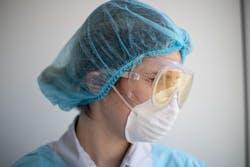Study suggests N95 respirators can be safely reprocessed 25 times to augment supply in future epidemics
New findings published in the American Journal of Infection Control (AJIC) show that even after 25 decontamination cycles there were no alterations to respiratory integrity or filtration efficiency among the seven N95 respirators the researchers evaluated.
The study found that a common type of N95 respirator can be safely reprocessed to augment supply during future epidemics. Researchers at Beth Israel Deaconess Medical Center and Massachusetts institute of Technology (MIT) reprocessed respirators using vaporized hydrogen peroxide (VHP), a standard decontamination approach, and found that the devices maintained their function and effectiveness on human subjects with up to 25 cycles of re-use.
N95 respirators are commonly used in hospitals worldwide to protect healthcare personnel from infectious pathogens. During the SARS-CoV-2 pandemic, healthcare facilities experienced shortages of the respirators, forcing personnel to re-use them or resort to less protective alternatives (e.g., facial masks).
“The findings from our study expand upon previous findings that VHP is a relatively safe method for reprocessing N95 respirators, and could help address shortages in future epidemics,” said Christina F. Yen, MD, infectious diseases physician who completed her healthcare epidemiology and infection control training at Beth Israel Deaconess Medical Center and the paper’s lead author. “It is important that we now find ways to scale and translate this capability to smaller hospitals and resource-limited healthcare settings that could benefit just as much – perhaps more – from this type of personal protective equipment reprocessing in future disaster scenarios.”
Dr. Yen and colleagues used VHP to serially decontaminate seven N95 respirators. After each VHP cycle, they conducted a series of qualitative and quantitative tests to evaluate both the function and effectiveness of the respirators on human subjects as compared to baseline. These tests comprised a user seal check (performed by subjects donning and doffing the respirators), qualitative and quantitative respirator fit testing, and filtration efficiency testing, which assesses the ability of the respirator to filter out particles.
The researchers noted that successful, large-scale implementation of N95 respirator reprocessing requires planning and coordination, multidisciplinary teams to ensure disinfection efficacy and end-user safety, and significant logistical support.
“In order for reprocessing to be a realistic option for healthcare facilities, certain steps need to be taken,” Yen said. Examples of these steps include creating relationships between infection prevention, occupational health, environmental services, and other relevant functions within hospitals to facilitate implementation of appropriate technologies and advocating for the inclusion of personal protective equipment reprocessing in epidemic and pandemic planning.
“The findings from this study are encouraging and valuable, particularly given the N95 respirator shortage we experienced during the COVID-19 pandemic,” said Ann Marie Pettis, BSN, RN, CIC, FAPIC, and The Association for Professionals in Infection Control and Epidemiology (APIC) 2021 president. “The results make clear that investing in VHP capabilities now could help to ensure equitable access to personal protective equipment during any future pandemic.”
